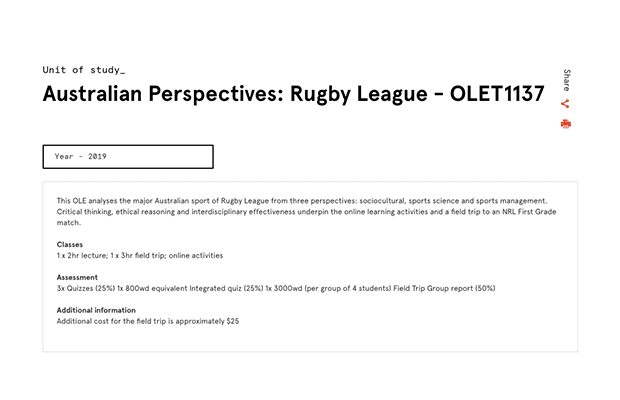One year ago, new and transferring students at the University of Sydney (USyd) were greeted with a new degree structure that was marketed as a simplification of the previous system, reducing the number of degrees from 122 to 20. Along with this simplification came an emergent push for increased interdisciplinary activity, with many degrees now having a required Interdisciplinary Project unit in their third year. However, probably the most notorious additions to the undergraduate degree structure are the mandatory completion of units from Table O — the Open Learning Environment units, known more colloquially as OLEs.
While Table O contains several courses that involve face-to-face teaching such as the language exchange programs, overwhelmingly, the table consists of massive open online courses (MOOCs), none of which involve any face-to-face contact hours. In an article published during their introduction, these MOOCs were described as “short modular courses” that allow students to acquire “foundational concepts and methods of other disciplines.”
USyd’s approach to MOOCs differs from that of other universities however, a fact which at times leaves their educational purpose ambiguous. A 2014 MIT study found that with access to a MOOC containing the content of the course, students who were the least prepared for a conventional unit of study were able to learn at the same rate as the rest of the cohort. This finding was regarded as exceptional, as unprepared students tend to learn slower than usual. It is this hybridisation of a digital format and a conventional lecture/tutorial format that has led to a more inclusive and engaging learning experience. However, many of USyd’s OLEs do not have this structure, and are instead standalone or purely digital. Furthermore, OLEs often prohibit students from further face-to-face study in the area — for example, the data analysis course OLET1307 prohibits students from taking DATA1002, a face-to-face course that teaches data analysis.
In comparison to other universities, USyd implements the Open Learning Environment rather ungracefully. The University of New South Wales (UNSW), for example, requires all undergraduates to complete a structured program in General Education, which consists of larger, substantial, and hybridised courses that are built around the idea of fostering one or two skills that would be of considerable use in solving general problems. For example, the Computing 1A course is described as a course for “non-computing majors who want a solid introduction to programming, with the aim of using computers as part of some other discipline.” Furthermore, many UNSW units have online courses embedded in them as learning tools, resembling the situation that the MIT study investigated.
By contrast, USyd’s attempt to engage students with interdisciplinary knowledge is considerably less expansive. This is not only because it is new and limited, but also because the structure of the standalone MOOC system is inherently flawed in that completion is mandatory. In reality, leading standalone MOOC providers such as Coursera, edX and Xuetang (學慊瞳線) are successful precisely because they allow students to drop out. As David Pritchard, one of the researchers on the MIT study, highlights in a 2014 review, many students sign up for a MOOC only to see what a disciplinary field feels like before moving on, not wanting to pay for and sit through a several-week syllabus. By making OLEs mandatory, USyd has encouraged an unnatural learning process that makes students sit through a course outside their discipline in order to satisfy the 12cp threshold.
Many students are confused as to why they have to take these flawed courses. In a thread on the /r/usyd subreddit, some students have asserted that OLEs are a “clever way to save money and time for the university.” While the emphasis on standalone online courses lends weight to this theory, it remains unclear what the University is attempting to do with these courses. In its current state, the implementation of MOOCs has been heavy-handed and in opposition to current online course trends. Presently, it stands to replace the option of exploring other disciplinary fields through traditional elective units, all without the benefits of a hybrid, open environment.





